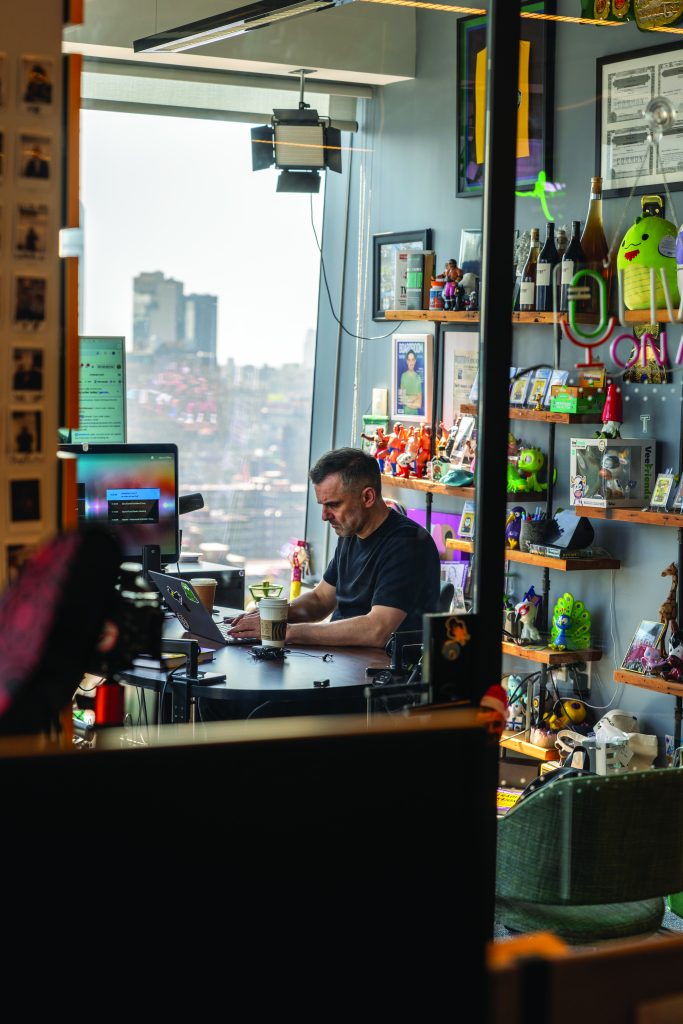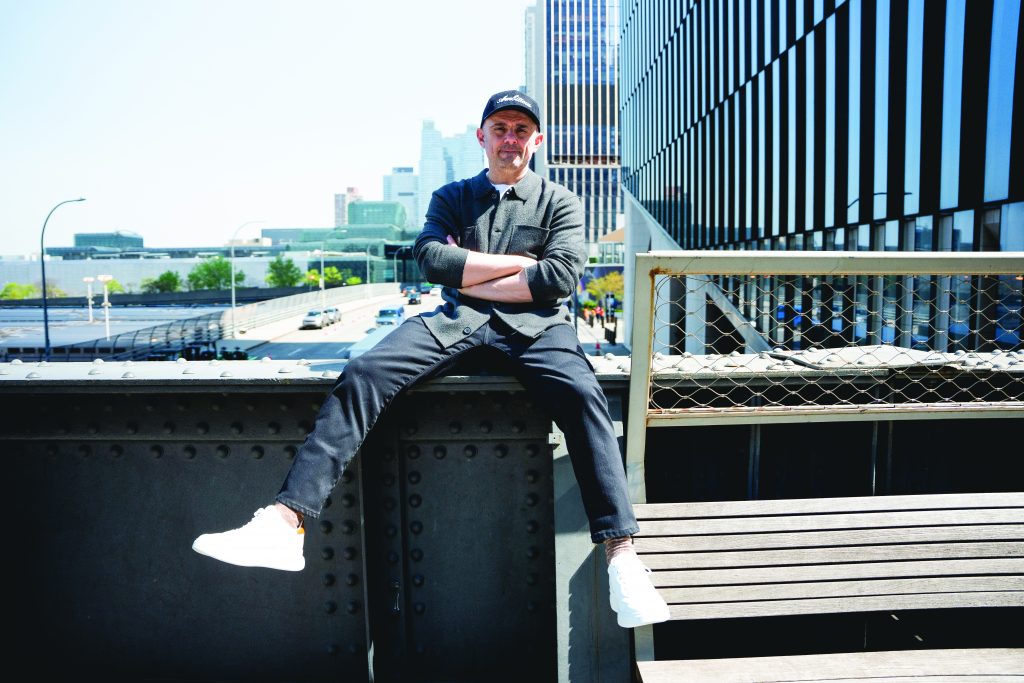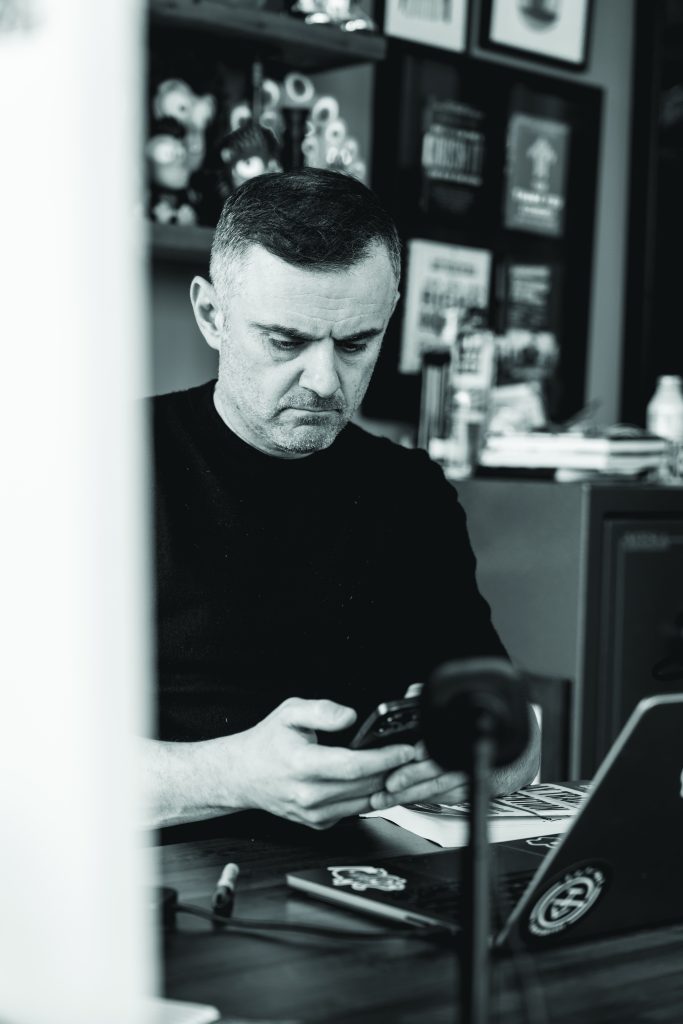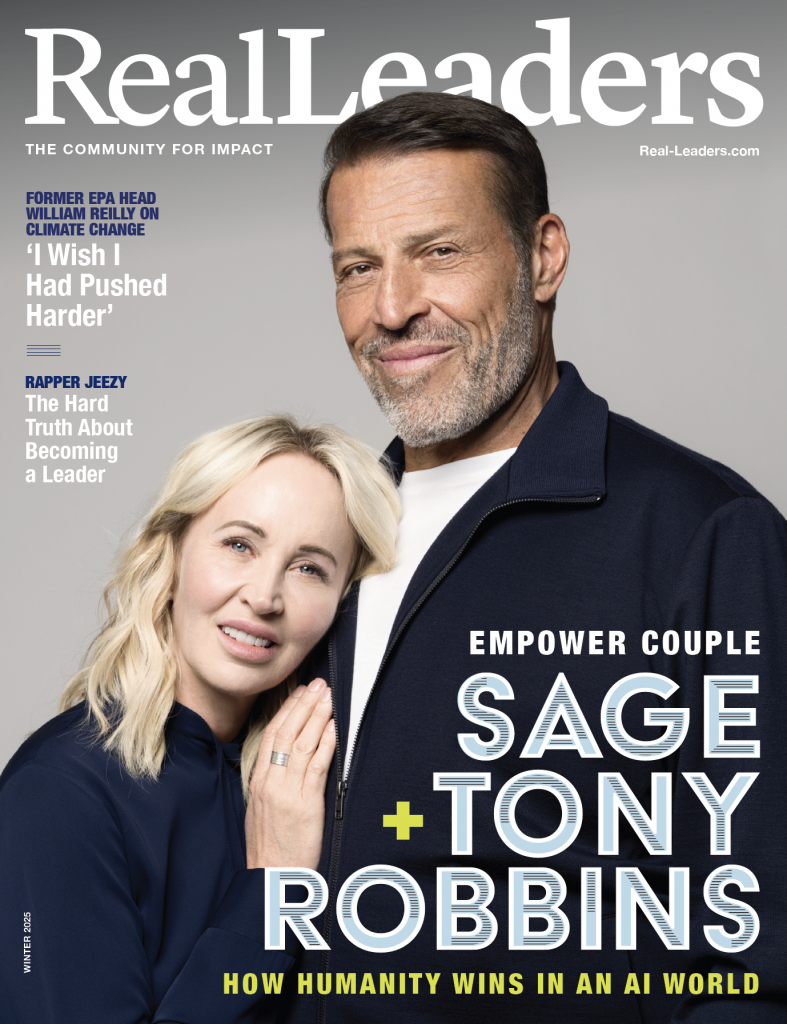The master of knowing what’s next, Gary Vaynerchuk tells real leaders where their brands need to be — right now — if they want to stay competitive.

Gary Vaynerchuk — or GaryVee as many know him — has more than 44 million combined followers across social media. Vaynerchuk has built his personal and business brands by producing consistently compelling content across all the major platforms, hosts a top 100 business podcast with daily episodes, and is a bestselling author. Plus, he ranked in the top three on the Real Leaders 2025 Top Keynote Speakers list. He’s a storyteller on steroids, a no-holds-barred kind of guy who will tell you where and why you’re going to fail — and how to get ahead of it.
Real Leaders: You’re a master of personal branding, but how can leaders build their brands online when there’s so much noise? What important lessons have you learned about branding and brand equity?
Gary Vaynerchuk: One of the coolest things about business is it’s kind of like sports in that it’s very merit based. I often hear, “But there are so many other people trying to do it,” or to your point, noise. And I always remind them there’s really no option. If you’re crippled by competition, you probably shouldn’t be in business in the first place. That’s a really important mindset going into this.
I take the other side of the pillow and see the absolute insanity of it in a positive way. Many of us remember a world when social media wasn’t the dominant force. What’s amazing about LinkedIn is I can post a video right now with great thoughts, and it can get 4 million views — if it wins on the merit of the creative. It’s not the social media that I grew up in when I invested in Facebook, Twitter, and Tumblr. Back in 2007 you had to build a community for a long period of time to get millions of followers so that a lot of people could see something you said.
So I think the answer to your question is tough shit. Of course everyone is going to compete with you. But we are no longer in the era of social media but interest media — and this is the most substantial thing that has happened in communication in a very long time. With interest media, even if you haven’t started a personal brand for the last 15 years and it’s your fourth day posting on LinkedIn, Instagram, or TikTok and you have six followers — I have news for you. Don’t think you’ve missed the boat and envy GaryVee because he’s been doing it for 15 years. Because of the way the algorithms work, we are on an equal playing ground now. If your stuff is good — but today I just kind of mailed it in and did a mundane C-minus execution compared to typical GaryVee content — your video is going to get more views than mine. That’s a level of merit of thought and creative that has never existed.

RL: You’ve said that how you make money is more important than how much you make. Is that a nod to impact businesses, and what are your thoughts about the impact space in general?
Vaynerchuk: I believe in the brands that pioneered the impact space like Patagonia and Tom’s shoes. What really happens in your life between age 40 and 90 is that the dollars in your bank account don’t drive the level of happiness you thought they would, and a lot of people are confused by that. How you make money matters because you’ll have a happier life as a human being if you believe in what you’re doing. You’ll have more joy in your life, in your family and friendships, and how you feel about yourself as you round out your journey.
When I think back to 2005 through 2010 when the early seeds of the impact movement got going, it was remarkable. But when I think about 2015, I felt like every startup I looked at would walk in and be like, “Gary, you’re gonna love my startup. We sell umbrellas, but every time we sell an umbrella, we give an umbrella to somebody in a rainforest.” And then I would look under the hood and be like, “Yeah, but you’re selling an umbrella for twice the price.” That’s not being altruistic — that’s just using good as a facade for your selfishness.
Now in 2025 we’re in a beautiful place. We’re in this place where humans are thoughtful about this, and we’ve got a little bit of the muckery and snake-oil salesmen using it as a weapon out of the system. We’re almost in this mature space where it is a subconscious or conscious thought of every entrepreneur when they start a company that social responsibility is an option, and that’s a remarkable place for us to be.
RL: What do you look for in a business before you put money or resources into it? Have your criteria changed since your days as an angel investor in Facebook, X (formerly Twitter), Uber, Snapchat, and Venmo?
Vaynerchuk: You know that I love to talk publicly about my big wins. There are many more losses that I don’t talk about. The beauty of being 49 now instead of my early 30s is that the last 15–20 years of investing have taught me that I’m looking for the jockey and the horse. In the earliest parts of my career, I would only invest if I thought the person behind the business could do it — so it was pure jockey. Then I got high on my own supply because I was so on fire that I lost my way a little bit and became only about the horse — if I liked the idea, I imagined myself in the role of helping it get big — so I almost overlooked the jockey. I am now firmly in a place where I have to adore the idea and the intuition, I have to believe that the human being in front of me is capable of seeing it through. So I look for that now, and because I do such early-stage investing, I don’t have the company’s results to rely on to prove that the person can do it. I have to go on my intuition. Can they do that? But I’m looking for what I call the jockey and the horse.
RL: You’re one of the leading global minds on what’s next — and you’ve been talking about live shopping recently and how it will revolutionize business. Can you expand on that and how it will affect founders and leaders?
Vaynerchuk: This is the quote, and you can put it in a dark black box: Literally anyone reading this article, if you sell something, you must stop reading this article immediately. Go spend 25 hours researching the current state of life, social shopping, TikTok Shop, obviously, notwithstanding what happens here with a U.S. ban or not. Obviously this is global. A startup called Whatnot is the leader, but we’ve already seen Walmart, Amazon, and eBay have their own live platforms. It’s inconceivable to me that Facebook, X, and YouTube do not have aggressive announcements. M&A perhaps — I don’t know what they’re up to. I have no inside information, but it’s inconceivable to me that we won’t see things from Instagram, Facebook, X, YouTube, and YouTube Shorts this year.
If you’re a businessman or woman who has lived in or executed in or paid attention to China, you’re completely bored by what I’m saying because this has been a decade of reality in China, but it’s finally hit the Western world. It’s significant. It could be incredibly detrimental to consumer packaged goods apparel or retailers if they dismiss it the way many dismissed Amazon and social media. This is big girl, big boy stuff. QVC and Home Shopping Network still do crazy amounts of revenue, and half of the people under 40 don’t even know they exist. Anybody over 40 is flabbergasted when they look under the hood. There is something inherently human that humans love to buy stuff when it’s in a live environment. It’s why live auctions do well. It’s why QVC does well. And when you take the conglomerate of the seven platforms that lead social media, the sheer attention, the hours spent by human beings in social media is profound and misunderstood in its dominance. And now you’re layering in shopping. This is a very big deal. I would argue, in a 15-year window, if Amazon stumbled and misplayed it, this could be the thing that knocks them off their perch.
Even if you’re a B2B company reading this right now, and you’re like, “Well, I sell SaaS. That doesn’t mean anything to me,” I implore you to figure out how to go do a collaboration with a fashion brand and make a cool hoodie for your B2B company and then sell it on live shopping just for the awareness and brand building — not the revenue, which I know would seem far-fetched to a B2B person reading this — but I’m not saying it for my health. It’s a big media.
In 2009, 2010, 2011, I begged traditional media companies to understand how big social media is. It’s similar to what I’m doing right now with retailers and package goods companies regarding live shopping.

RL: How does a traditional media platform like a magazine — an American pastime — stay relevant?
Vaynerchuk: By conforming to the new distribution model through an awareness of what it does. If you fall in love with your form factor instead of your brand, you become vulnerable. Sports Illustrated is a great example. Sports Illustrated could have been House of Highlights and Overtime, but it became obsessed with its medium, not its brand.
My dad’s wine store in New Jersey is in an affluent area — Millburn, New Jersey — a nice green town, good money, upper-middle class to wealthy. There are plenty of small stores on Main Street in Millburn that are just dying. Of course, we know why — online shopping, right? However, if one of those store owners woke up this morning and decided to turn their store, even a piece of it, into a studio that did live shopping all day long, they would explode over time if they were good. That’s another way of answering your question. It’s about not becoming delusional or ideological about your medium. It’s about becoming obsessed with your brand and finding ways to convert it into new attention parallels.
RL: Your new book, Day Trading Attention — what does that term mean?
Vaynerchuk: It was a big moment for me when I came up with the term — one of those eureka moments. It captures everything I’ve been trying to say for 15 years.
Attention is the ultimate asset in the world. Nothing can happen unless someone’s listening to it.
You can’t become president of the United States if you’re in a cave talking to yourself with no people around. As a parent, your child won’t become the human you want them to become if you don’t talk to them. Every single thing on earth is based on attention, what people give attention to. The quality of the content — the written word, the audio, the video, etc. — is the variable that determines if it lands or not. But without the attention, it’s that whole thing about if a tree falls in the forest, does it make a sound if no one is there to hear it? So attention is my obsession.
I grew up building my dad’s business and then my personal brand — first on direct mail, print magazine ads, newspaper ads, radio, and local television. Then I did it on Google AdWords and email marketing, then I did it on YouTube, then I did it on social media. And I promise you, based on the history of my career, I will be at the forefront of when VR matters. I promise you when and if VR gets three hours of your day the way a phone does, you’ll go into your VR device, and you will be like, there he is — there’s Gary — because I don’t have any romance. And this is actually very important for every real leader to hear: I am not romantic about how I got here or how I currently make my money because if I do, I can get caught back to antiquated. I’ve got to always understand where it’s going, and I’ve got to get that timing right.
Day trading is a term on Wall Street, and it is very different than the way people used to invest in stocks. Our grandparents and our parents, they would buy a stock and they would go to sleep, or a mutual fund and they would be like see you later, I’ll look at it in a couple of years. Then when the internet came along, we had these kids buying stocks and selling them every second — day trading. If I buy an ad in a magazine, I’ve got to make the ad, buy it, and then there’s a long period of time before it shows up in an issue. Magazines are great and important, but the way social works now, the sheer tension, the speed in which you have to make content and be on top of this, is more like day trading than buying mutual funds — so day trading attention captured the essence of what I want to say about marketing. From Nike to Real Leaders, to GaryVee the personal brand, to a store on Madison Avenue, to a law firm — if you are doing marketing, if you are trying to get attention, if you want to succeed and build anything, a personal brand or a business, the more you understand that you’re day trading attention now, the better you will succeed.
Once you understand that, you start to realize how much science and art and strategy and complexity there is to be good at it. If I told every kid who was an athletic freak 20 years ago when they were 6 years old, “Hey, you should all become basketball players — not football players — because I see the future, and basketball is going to grow, and because there are only 15 players on a basketball team and not 53 like there are on a football team, you make a lot more money if you’re a good basketball player,” that would have been the right strategy that wasn’t obvious 20 years ago. And yes, being great is hard, and that’s what this is: I’m telling you that basketball is coming, but the reason I wrote the book is to show you how to train and actually be great at it.
RL: If I’m a direct-to-consumer, socially conscious, or certified B Corp company, where should I be playing online today?
Vaynerchuk: I mean required — not even optional — Facebook, Instagram, TikTok, and YouTube Shorts. I couldn’t comprehend if you’re trying to sell something direct to consumer not being on those channels. The next tier would be X, LinkedIn, and Snapchat Spotlight, which is the TikTok/Instagram part of Snapchat. But the first four are utterly required to have any prayer of success.
RL: If I’m a small B2B service provider looking to target socially conscious business owners, what kind of strategy would cater to them best?
Vaynerchuk: This is going to blow people’s minds. The AI algorithms that run the For You Pages and the feeds of the social networks are getting better and better by the hour in understanding content and then putting that content in front of the people they’re trying to reach. Can you imagine what’s going to be in place in a year or two? It’s already happening — but I’ll go with a year or two — where this individual who’s saying words like “socially conscious” or “for good,” literally algos are picking that up, and then the feed will send it to people who’ve shown a propensity for being interested in that subject matter.
So my answer for that B2B service provider you describe would be very heavy in YouTube Shorts and LinkedIn to reach that socially conscious business person — LinkedIn because it just finds the B2B environment and YouTube Shorts because YouTube is the second-biggest search engine in the world, and so when you put a social piece in there, a YouTube Short will show up for the people looking for that kind of content, and that would be stronger than you doing it on Facebook and Instagram right now.

RL: If you are a founder growing a business on social media, should you grow it on your personal platform profile or on the company’s?
Vaynerchuk: Great question. The answer is both. Every business brand I have has its own pages, and then I have my pages. Humans tend to over index brands and companies. It’s just the nature of the medium, but by doing both you’re able to take the human audience and push them to your business, and you can work with them back and forth. Collab posts are now a thing, and so I genuinely believe it’s both. But if somebody’s crippled by that and thinks that’s so hard, or they can’t, the reality is either will work.
RL: Should a company have brand guidelines, or is that giving away the ultimate creativity?
Vaynerchuk: Should brands have guidelines? Sure. It’s good to know what you’re up to for new employees. But for the leaders reading this, this is a marketing terminology issue more than a business and operations one. In Marketing Land, how to build a brand, brand guidelines — a lot of this stuff is hurting people in the new world. It was good for television — it’s not good for social media. I would rather brands focus on being relevant to as many different consumer segmentations as possible versus coming up with a tagline or color scheme that restricts their creativity in this new world.
RL: Real Leaders is all about the holistic leader — developing not just the professional side, but the personal side. We have a lot of family businesses in the Real Leaders community. Are you thinking about bringing your kids into your business?
Vaynerchuk: I have no ambition for my children to be businessmen or women. If my daughter and son end up not being an entrepreneur or not even interested in business — let’s say they want to go nonprofit, or they want to be a politician, or they want to be an artist — I’m great with that because I’m obsessed with my children being as passionate about what they do as I am about what I do. If they decide they want to be in the game, the first thing that comes to mind is the fear of nepotism. I’m incredibly scared to create a fake environment that will ultimately be financially lucrative for my children but will be emotionally detrimental. I wouldn’t even do it to my own employees because I view them as family. I wouldn’t put my children in a position that lets them leapfrog over someone who’s earned it.
My kids are 15 and 12 right now, so I’m still a few minutes away from the red zone, but I’m at the point where it’s worth thinking about. I’m very fortunate that I’m growing up in an era where we’ve got 100 years of data and anecdotal examples of what can go wrong when you don’t play this right. The good news is, I don’t have my own self-esteem wrapped up in my children’s financial and professional success. What really hurts parents is when their self-esteem is wrapped up in their kid’s school, in their sports, and how much money they make. I don’t have that. I’m obsessed with being their father — not their friend or cheerleader — and as a father, I need to be a counterpuncher to the truth of who they are in their soul and try to help them into a place of joy and fulfillment and passion, and hopefully that will be how it plays out.





